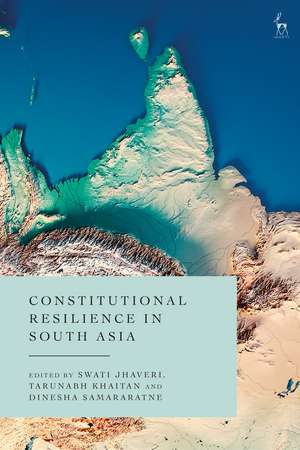Constitutional Resilience in South Asia
Editat de Swati Jhaveri, Tarunabh Khaitan, Dinesha Samararatneen Limba Engleză Hardback – 31 mai 2023
Preț: 517.10 lei
Preț vechi: 735.12 lei
-30% Nou
Puncte Express: 776
Preț estimativ în valută:
98.96€ • 102.23$ • 82.36£
98.96€ • 102.23$ • 82.36£
Carte tipărită la comandă
Livrare economică 25 martie-08 aprilie
Preluare comenzi: 021 569.72.76
Specificații
ISBN-13: 9781509948857
ISBN-10: 1509948856
Pagini: 504
Dimensiuni: 156 x 234 x 34 mm
Greutate: 0.88 kg
Editura: Bloomsbury Publishing
Colecția Hart Publishing
Locul publicării:London, United Kingdom
ISBN-10: 1509948856
Pagini: 504
Dimensiuni: 156 x 234 x 34 mm
Greutate: 0.88 kg
Editura: Bloomsbury Publishing
Colecția Hart Publishing
Locul publicării:London, United Kingdom
Caracteristici
Looks at the design and functioning of institutions, legislatures, the political executive and the military to understand their role in strengthening or undermining constitutional democracy in South Asia
Notă biografică
Swati Jhaveri is an Associate Fellow of the Asian Law Centre at the Melbourne Law School, Australia.Tarunabh Khaitan is Professor of Public Law and Legal Theory at the University of Oxford, UK, and Professor of Law at the University of Melbourne, Australia.Dinesha Samararatne is Professor in the Department of Public & International Law of the Faculty of Law of the University of Colombo and a Senior Research Associate of the Laureate Programme in Comparative Constitutional Law, Melbourne Law School, Australia.
Cuprins
PrefaceForewordArun Thiruvengadam (National Law School, India) Part 1: The Problem of Constitutional Resilience Decoded1. Constitutional Resilience in South Asia: A Primer, Swati Jhaveri (National University of Singapore, Singapore), Tarunabh Khaitan (University of Oxford, UK) and Dinesha Samararatne (University of Colombo, Sri Lanka)Part 2: Constitutional Design2. Institutional Resilience and Political Transitions in Sri Lanka and Beyond, Dian Shah (National University of Singapore, Singapore) and Mario Gomez (International Centre for Ethnic Studies, Sri Lanka)3. Old Powers and New Forces in the Bhutanese Constitution - Anticipating the Resilience of a Young Constitution, Michaela Windischgraetz (University of Vienna, Austria)Part 3: Federalism4. Territorial Dynamics in Sri Lanka: Federalism, Unitarism and Path Dependence, Jayani Nadarajalingam (University of Melbourne, Australia) and Zim Nwokora (Deakin University, Australia)5. Proposing a Solidarity-Based Federalism for Sri Lanka, Erika Arban (Melbourne Law School, Australia)6. The Constitutional Resilience of Human Rights in New Federal States: Local Government and the National Human Rights Commission in Nepal, Hari P. Dhungana (Nepal Open University, Nepal) and Iain Payne (University of New South Wales, Australia)Part 4: The Political Branches7. Killing a Constitution with a Thousand Cuts: Aggrandisement and Party-State Fusion in India, Tarunabh Khaitan (University of Oxford, UK)8. Dysfunction and Ad Hocism in Agenda Setting: Compromising of the Lok Sabha in India, Devendra Damle (Open Network for Digital Commerce, India) and Shubho Roy (University of Chicago, USA)9. Dysfunction Resilience of the Afghan Civil Service, Ebrahim Afsah (University of Vienna, Austria)Part 5: The Judiciary10. The Maldives: A Parable of Judicial Crisis, Institutional Corrosion, and Democratic Demise, Ahmed Nazeer (University of Portsmouth, UK)11. Judicial Evasion, Judicial Vagueness and Judicial Revisionism: A Study of the NCT of Delhi v Union of India Judgment(s), Gautam Bhatia (India)Part 6: Fourth Branch (Guarantor) Institutions12. Sri Lanka's Guarantor Branch: Constitutional Resilience by Stealth? Dinesha Samararatne (University of Colombo, Sri Lanka)13. The South Asian Fourth Branch: Designing Election Commissions for Constitutional Resilience, Michael Pal (University of Ottawa, Canada)14. Between Trust and Democracy: Th e Election Commission of India and the Question of Constitutional Accountability, M. Mohsin Alam Bhat (Jindal Global University, India)15. The Turbulent Journey and Overlooked Opportunities of Electoral Democracy in Bangladesh, Muhammad Omar Faruque (Bangladesh Judicial Service, Bangladesh)Part 7: The Military16. Rescuing the Agency and Resilience of Civilian Political Actors: Civil-Military Relations in Pakistan, 2008-20, Farhan Hanif Siddiqi (Quaid-i-Azam University, Pakistan)17. A Frozen Democratic Transition: Pakistan's Hybrid Regime and Weak Party System, Muhammad Salman (Habib University, Pakistan) and Marzia Raza (University of Osnabrück, Germany)Part 8: The People18. Rethinking Constitutional Resilience from Below: Dalit Rights and Land Reform, Faizan Jawed Siddiqi (Massachusetts Institute of Technology, USA)19. Constitutional Patriotism in India: Appreciating the People as Constitutional Actors, Jahnavi Sindhu (Humboldt University, Germany) and Vikram Aditya Narayan (Humboldt University, Germany)Part 9: Conclusion20. Epilogue: Resilience and Political Constitutionalism in South Asia and Beyond, Philipp Dann (Humboldt University, Germany)
